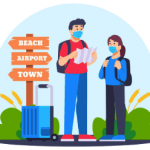1. International students registering with the Police
Some people need to register with the police after arriving in the UK with a visa, or after getting permission to stay for longer in the UK.
If you need to register, you must go to the police within 7 days of you:
- arriving in the UK if you applied for a visa from outside the UK
- getting your biometric residence permit if you applied to stay for longer from inside the UK
How to register
Take your documents and information to the police station for your area. It costs £34 to register. Pay at the police station.
You need to take:
- 2 recent passport size colour photographs.
- your passport.
- your visa ‘vignette’ (sticker in your passport), if you applied outside the UK.
- the letter you got from the Home Office when your application was approved, if you applied inside the UK.
- your biometric residence permit, if you have one.
Where to register
The police station you go to depends on where you live.
If you live outside London
Contact your local police station to find out where to go if you live in:
If you live in London
Contact your local police station if you live in the City of London.
2. Register with GP practice (NHS)
You have the legal right to choose a GP practice that best suits your needs. Try comparing GP practices according to facilities, services, access and performance before you decide. Ask friends, relatives and others you trust for their thoughts and recommendations.
The GP practice must accept you, unless there are reasonable grounds to refuse you.
These must not relate to race, gender, social class, age, religion, sexual orientation, appearance, disability or a medical condition. It must also give you reasons for its decision in writing.
Registering with a GP
When you have found a practice you like, you’ll have to formally register with it as an NHS patient by submitting a registration form to them.
The GMS1registration form is available at the practice, or you can download it from GOV.UK. Forms may vary slightly, and some practices use their own version.
Some GP practices may ask for proof of identity when you register. You should not be refused registration or appointments because you do not have a proof of address or personal identification at hand.
3. Figure out public transport
Local travel
All cities will have a local bus service which is often the most convenient way of travelling around a city. First suss out how far away you’re going to be living from campus, and whether it’s worth investing in a student bus pass to save some cash.
Bigger cities might also have a subway system, like the Tube in London or the Metro in Newcastle, and you might be able to invest in a yearly pass to help keep costs down. For travel in London specifically, take a look at the 18+ Oyster card – it is by far the cheapest option and can be used across various different modes of transport.
If you’re confident enough, travelling by bike is a great way to save money while being environmentally friendly too.
National travel
If you’re over in the UK for the first time, you’ll probably want to visit a few different cities and sights while you’re here.
Your two main options here are coach or train.
Trains are often the quickest and most comfortable way to get around the UK. However, tickets should be booked as early as possible to save money.
You’ll probably also want to invest in a 16–25 Railcard or a 26–30 Railcard, which will save you a third on all rail fares.
4. Set up a student bank account
If you’re staying in the UK for longer than a few months (so longer than a semester), it is recommended to set up a bank account.
This will make it easier to pay bills, keep your money safe, and avoid foreign currency charges you would otherwise be paying if you used a non-UK bank account to pay for things in Britain.
Setting up a bank account can be a lengthy process, as banks will need lots of information to verify your identity and credit rating.
In order to open a bank account while you’re here in the UK, you will need the following:
A valid passport
A valid visa : Non-EU students only
Proof of address in the UK : A tenancy agreement or utility bill should suffice
Proof of address in your home country
Proof of student status : You’ll normally receive this once you enrol at university
Proof of income : This may mean a credit check and interview to establish you will be able to maintain the account.
You’ll almost certainly have to attend the bank in person to get everything set up, so don’t expect to be able to do everything on your laptop.
5. Apply for a National Insurance Number
Your National Insurance number (NINo) is a unique personal number which is used to record your National Insurance contributions. You do not need to have a NINo before starting work, but you must obtain one when you get a job.
How to apply
To apply for a National Insurance Number you must be in the UK and have the right to Work or right to study in the UK. You apply for a NINo by calling 0800 141 2075.
After you’ve applied
You might be sent a letter, asking you to attend an appointment. If this happens, the letter will list the documents you will need to bring to the appointment. You usually need to take your passport, pay slips or a letter from your employer confirming that you will be working for them. Your appointment will take place at your nearest Job center Plus office, or Social Security office in Northern Ireland.


